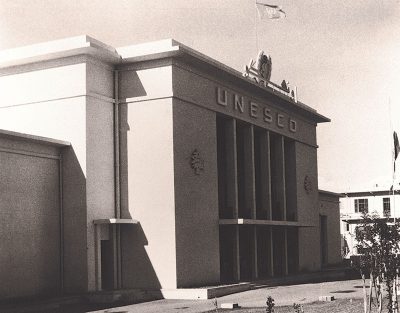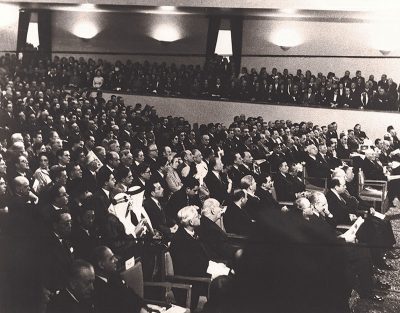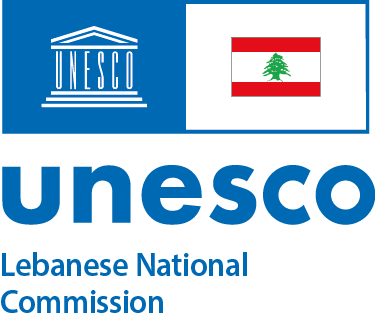3rd Session of UNESCO General Conference
Of the very few General Conferences of UNESCO held outside the Organization Headquarters in Paris was the one held in Beirut in 1948.
Upon the invitation of the Lebanese government, the third session of UNESCO General Conference of was held in Beirut – Lebanon from November 17 to December 11, 1948. The UNESCO Palace, which served as the venue for the General Conference 3rd Session, was built especially for the occasion and was inaugurated at its opening meeting.

UNESCO Palace

3rd Session of UNESCO General Conference (Beirut, 1948)
In recognition of the efforts exerted, the UNESCO General Conference adopted at the conclusion of its 3rd session, the following resolution:
UNESCO 1948 General Conference:
“Deeply touched by the generous hospitality of the Lebanese authorities,
Keenly alive to the interest shown by the people of Lebanon in UNESCO and its aims and ideals, an interest which is evident of the close kinship between UNESCO and traditional Lebanese aspirations,
The General Conference expresses
To His Excellency Sheikh Bechara El Khoury, President of the Republic of Lebanon,
To the members of the Government, specially to His Excellency Hamid Bey Frangie, Minister of Foreign Affairs and Education,
Its deep gratitude
For their cordial invitation to UNESCO to hold the Third Session of its Conference in Beirut, for the unsurpassable facilities they have furnished to UNESCO, enabling it to hold its meetings in the splendid building specially erected for its reception, and for the unstinting help they have given to UNESCO in every direction, for the purpose of ensuring the organization and success of the Conference;
Expresses further its gratitude to Monsieur Maroun for all his efforts towards the preparation and organization of the Conference.
Also, The General Conference,
Recognizing the devoted collaboration extended to UNESCO by the Lebanese Press, both in the preparatory stages of the Conference and throughout its work,
Thanks the members of the Lebanese Press for the notice they have given to UNESCO, for their ready response to its appeal and for their wide publicizing of the results of the Conference. It is through their help that the public opinion of the Lebanon and, beyond the national frontiers, world opinion have been kept informed from day to day of the progress of the Conference and have been able to realize UNESCO’s contribution to the development of trustful relations between the peoples and to the maintenance of peace”
19th plenary meeting (11 December 1948)
Initiation
In conformity with article VII paragraph 2 of UNESCO Constitution, Lebanon was among the very first member states of UNESCO to establish its own national commission for UNESCO (presidential decree n°12141, June 28, 1948), thereafter known as the Lebanese National Commission for UNESCO (LNCU). In turn, and since 1991, the LNCU has been acting as the National Commission for the Arab League Organization for Education, Culture and sciences (ALECSO).
A number of personalities renowned for their contributions in the areas of concern of UNESCO (education, science, culture, communication and information) assumed responsibilities at LNCU in their respective capacity as Presidents or Secretaries General.
Mission
Being a unique phenomenon within the United Nations system and the Arab League Organization, also specific to their specialized agencies – UNESCO and ALECSO, National Commissions are entrusted, within their member states, with the responsibility of making the missions of both organizations known in the widest possible national circles of education, science, culture, communication and information.
Both organizations, having the same areas of competence mandated the national commission with the following:
- To ensure their active presence in the member state through education, science, culture, communication and information.
- To promote awareness of the two organizations’ ideals and objectives within their framework of responsibilities.
- To involve national intellectuals and scholars, as well as communities known for their contributions to the advancement of education, science, culture, communication and information, in the organizations’ respective activities and programs.
Tasks and Roles
In accordance with its mandate, the Lebanese National Commission for UNESCO assumes four major tasks, in line with its purposes and functions as specified by its statutes and as defined by UNESCO’s Constitution (Article VII) and Charter of National Commissions.
- An advisory role, to advise the various national ministerial departments, as well as the national agencies, institutions and organizations on all matters related to UNESCO and ALECSO and their respective programs.
- A liaison role, to serve as a liaison agency between the national bodies concerned with the spheres of education, science, culture, communication and information on one hand, and UNESCO and ALECSO on the other.
- An informative role, to publicize the mission and work of UNESCO as well as ALECSO, disseminating their values and promoting awareness of issues that they deal with.
- An executive role, under which it is associated, on behalf of its member state, in the formulation, execution and evaluation of UNESCO and ALECSO programs and budgets.
